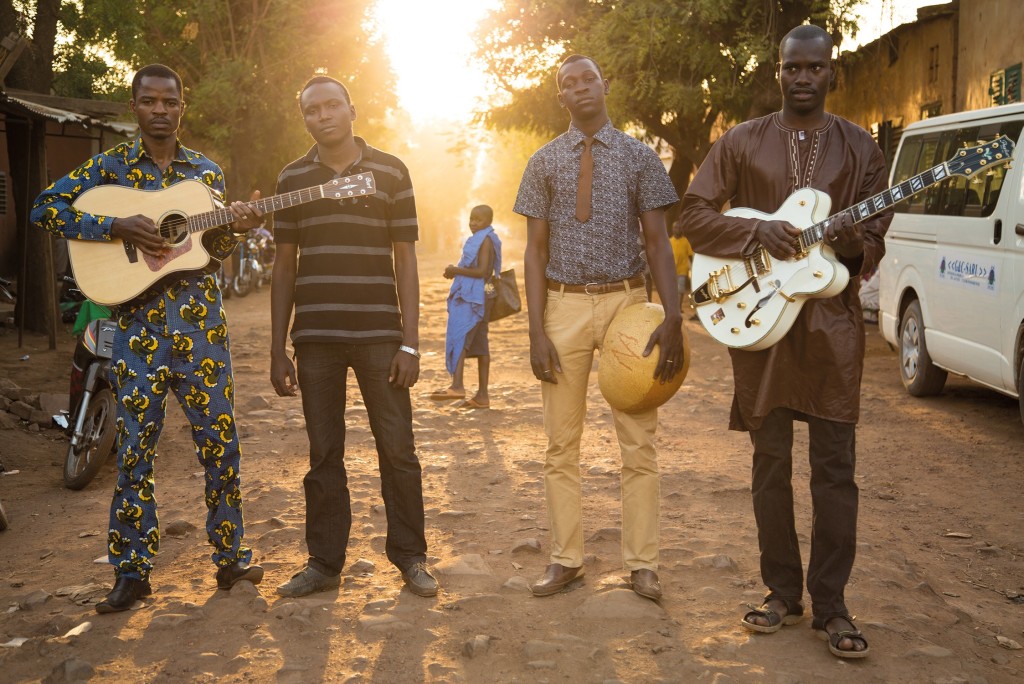‘They Will Have To Kill Us First’ doc shows Malian music can’t be stopped
Music was as essential as air for those living in the west African country of Mali. Then the Islamist militants flooded in and banned music, choking off an integral part of Mali’s culture.
Instruments were burned, radio stations were ripped apart and musicians were tortured. The feature-length documentary, “They Will Have to Kill Us First: Malian Music in Exile” shows what life was like when jihadists tried to stop the music. It opens this weekend in New York at the Village East Cinema and is coming to Los Angeles and other cities on April 1.

The Sonhoy Blues, a band who formed in a refugee camp. Photo courtesy of BBC Worldwide North America/Together Films.
“I didn’t realize when I was making the film how important it was going to be for me to bring the film home to America,” first-time director Johanna Schwartz told me on Friday. “Screening it here this weekend has opened my eyes to how important this story is, right now, in this country.
“Conversations about refugees, conversations about Islam, conversations about freedoms – I’m seeing these things go around and around in circles at the moment and I think the stories of Mali’s great musicians have an opportunity to slice right through all of that and turn all these conversations on their head,” said Schwartz, who previously was a filmmaker for BBC World.
Her documentary is beautifully shot and portrays a fight for freedom through the use of music. With an original score by Nick Zinner of the Yeah Yeah Yeahs, it also features the accessibly energetic, soulful rhythmic sounds of Malian music.
Schwartz’s film introduces us to Songhoy Blues, a four-man band that formed in a refugee camp. There’s also “Disco” and Jimmy, a couple whose lives capture much of the struggle in Mali: She’s a famous singer who works in refugee camps and he’s a leader in the National Movement for the Liberation of Azawad, the military separatist group that initially worked alongside the Islamic extremists before the jihadists took over. The documentary also features Khaira Arby, a beloved national singer, and Moussa Sidi, a guitarist who left his music, his wife and his country when the militants moved in.
In one visually stunning scene, the Songhoy Blues members rehearsed along the river bank for hours. Then the sun sank below the rust-tinged skies and the band had to stop the jam session because after dark, it was no longer safe. In the film, the group made an album and traveled to London to hear the record. When their music began to play, the men broke into wide smiles, hugging and jumping with excitement. Then one by one, they grew quiet, some with tears in their eyes.
It was a quiet moment of triumph. Amid the music ban in Mali, the Songhoy Blues made an album. The album has since been critically acclaimed and they have been performing at festivals around the world.
The documentary also gave some insight to feminism under Sharia Law. Arby, the national singer, recalled how she could walk around the ancient city of Timbuktu whenever, wherever and however she wanted. She mourned the loss of that freedom, but vowed to help Timbuktu return to happier times by pushing for a public concert. It was an adventurous, and potentially dangerous goal, but the film shows Arby’s refusal to quit.
When “They Will Have to Kill Us First” premiered in Sweden at the Gothenburg International Film Festival in January, Schwartz said she hoped her film would get more people talking about the persecution and censorship of musicians.
“It’s about freedom of expression,” Schwartz said. “It’s a way to open up the world and think about the world as one place, not individual countries and I think that music can do that better than anything else.”


Comments
‘They Will Have To Kill Us First’ doc shows Malian music can’t be stopped — No Comments